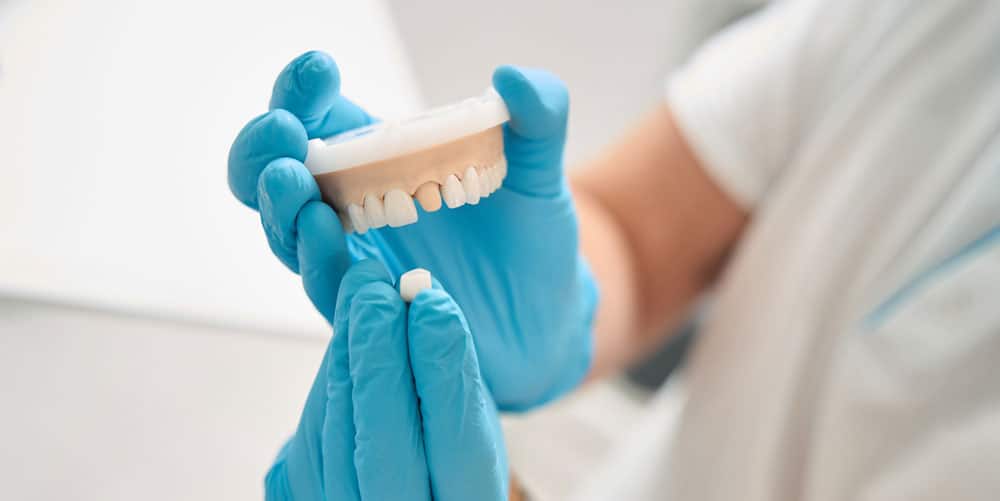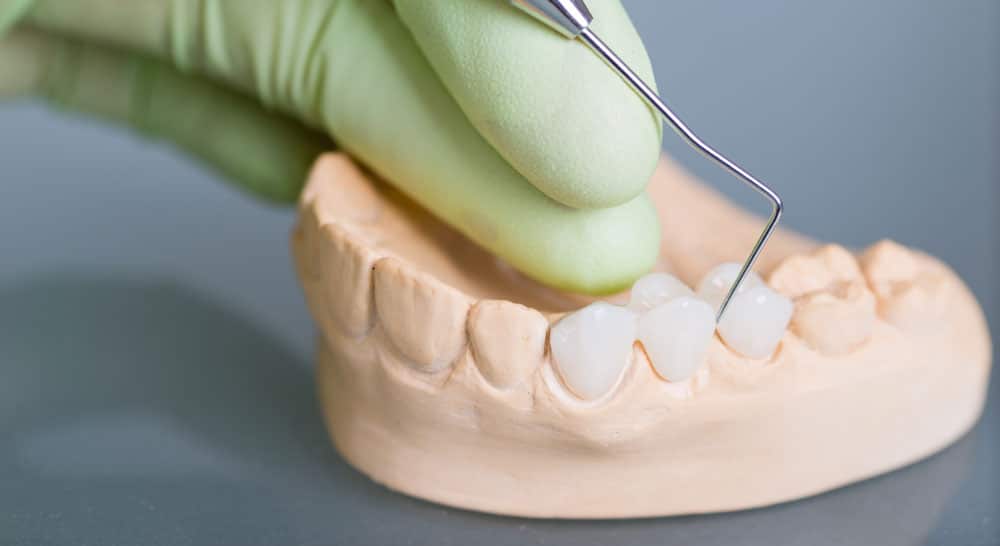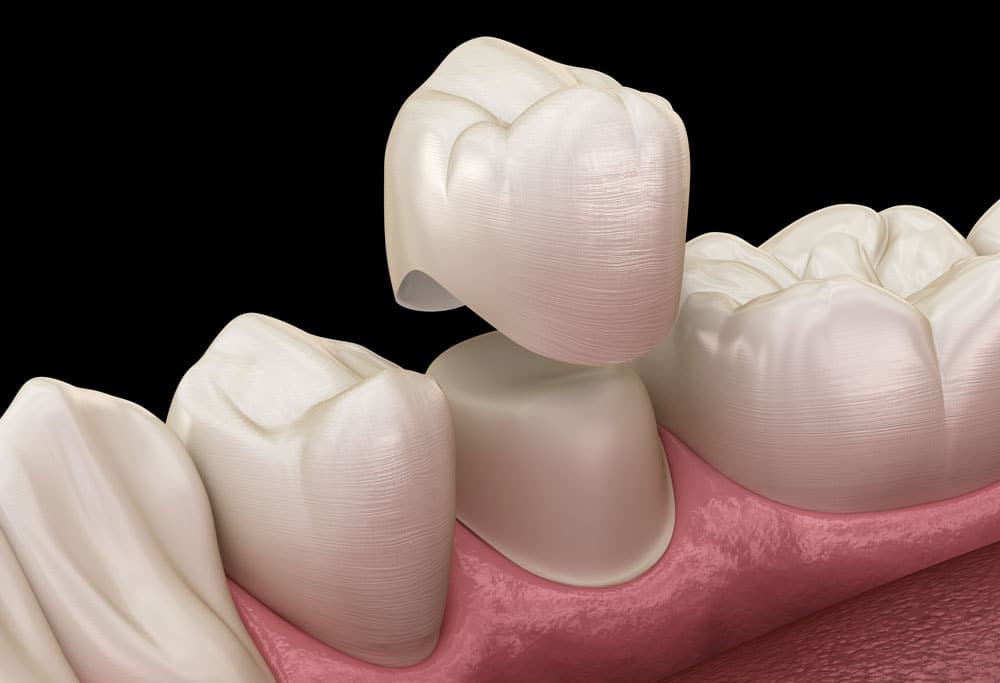Maintaining optimal oral health is vital for overall well-being. When faced with dental issues such as damaged or weakened teeth, it’s crucial to explore the best treatment options available. One of the most effective solutions in restorative dentistry is the use of dental crowns. A crown serves as a protective cover that restores the functionality and appearance of a tooth. In this blog post, we will explore the different types of crowns, the procedures involved, the signs that indicate the need for a crown, and the factors to consider when making this important decision.

Understanding dental crowns
What are dental crowns?
A dental crown is a type of cap placed over a damaged tooth to restore its shape, size, strength, and appearance. Think of a crown as a “dental cap” that provides additional protection and support.
Crowns are typically used when a tooth is severely decayed, badly broken, or after a root canal treatment. They serve to protect the natural tooth structure while providing an aesthetically pleasing result.
Crowns are designed to mimic the function and appearance of your natural teeth, ensuring that you can chew and speak normally after treatment. They are custom-made to fit perfectly over the prepared tooth, effectively restoring its functionality and improving your smile.
Types of materials used for crowns
Porcelain crowns
The most traditional crown out there, all porcelain crowns are often chosen for their ability to match the colour of natural teeth. They are perfect for front teeth as they look like natural teeth. Porcelain also offers a translucent quality, making it an excellent choice for those who desire a natural look.
Metal crowns
Metal crowns, particularly those made from gold alloy or other durable metals, are highly resistant to wear and can withstand the forces of chewing. They are generally used for molars and are less visible, making them a practical choice for back teeth.
Composite resin crowns
Composite resin crowns can be shaped and coloured to match your natural teeth. While they are less durable than other materials, they offer a cost-effective solution and can be a good option for less visible areas.
Zirconia crowns
Zirconia crowns provide a balance of strength and aesthetic appeal, making them suitable for both anterior and posterior teeth. Their biocompatibility and resistance to wear make them a popular choice.
All-ceramic crowns
These crowns are ideal for individuals with metal allergies, providing a fully metal-free solution that looks natural and blends well with surrounding teeth. All-ceramic crowns offer excellent aesthetics and are typically used for front teeth.
Signs you may need a dental crown
Identifying when you need a dental crown is essential for maintaining good dental health. Here are some common signs that may indicate the necessity for a crown:
Cracked or fractured teeth
If you’ve experienced trauma to your mouth, resulting in a cracked or fractured tooth, a dental crown may be necessary to protect and support the damaged tooth structure. Cracks can worsen over time and may lead to further complications, including infections.
Severe tooth decay
Severe decay can weaken a tooth significantly. If a large portion of the tooth is affected, a crown can restore its integrity and functionality, allowing you to maintain your natural teeth for longer. Without intervention, tooth decay can progress and lead to tooth loss.
After root canal treatment
Following a root canal, the tooth may become fragile. A permanent crown is often recommended to protect the crowned tooth and ensure its longevity. The crown not only restores function but also helps to maintain the tooth’s structure and appearance.
Large fillings
If a tooth has undergone extensive filling due to decay, a crown may be necessary to provide support and prevent future breakage. Crowns help distribute chewing forces more evenly, reducing the risk of damage to the remaining tooth structure.
Missing teeth
When a tooth is missing, a dental implant may be placed, and a crown is then attached to the implant to restore function and appearance. This combination allows for a natural look and feel while ensuring that surrounding teeth remain unaffected.
Aesthetics
If you have discoloured or misshapen teeth that impact your smile, a dental crown can enhance your appearance. Many people choose crowns for cosmetic reasons, particularly for front teeth where appearance is essential.
Benefits of dental crowns
Restoring tooth functionality
Crowns are designed to restore the functionality of the affected tooth, enabling patients to chew and bite without discomfort. A properly fitted crown allows you to eat your favourite foods without fear of damaging the tooth.
Enhancing aesthetic appearance
Whether you opt for porcelain crowns for front teeth or metal crowns for molars, crowns can significantly improve the appearance of damaged or discoloured teeth. The colour and shape can be customised to match your existing teeth, resulting in a seamless smile.
Preventing further damage
By covering a weak tooth, crowns help to prevent further decay and damage, acting as a protective layer. This is especially crucial for teeth that have been weakened by decay or trauma.
Durability
Crowns, particularly those made from metal or zirconia, are incredibly durable and can last for many years with proper care. Their strength makes them ideal for restoring functionality to teeth that undergo significant wear and tear.
Improved comfort
Many patients find that their crowns improve their overall comfort when chewing and speaking. This is particularly true for those who have previously experienced pain or sensitivity due to damaged teeth.
Factors to consider before getting a crown
Before deciding on a dental crown, several factors need to be considered to ensure that it is the best option for you:
Type and extent of damage
The type of damage to your tooth will influence the type of crown needed. A badly broken tooth may require a different approach than one that is merely weakened. Your dentist will evaluate the extent of the damage and recommend the most appropriate crown type.
Overall oral health
Your overall oral health plays a critical role in the success of any dental treatment. Conditions such as gum disease may need to be addressed before proceeding with a crown. If the surrounding tissues are not healthy, the success of the crown may be compromised.
Financial considerations
Understanding the costs involved, including whether your insurance covers the dental crown procedure, is essential. The price may vary depending on the type of crown and the complexity of the treatment. Consulting your insurance provider can give you an idea of what to expect.
Longevity and maintenance
Consider how long you want the restoration to last. Different materials have varying lifespans, and your choice may affect future dental care. It’s also essential to discuss the maintenance required for each type of crown to ensure you are prepared.
Aesthetic considerations
If the affected tooth is visible when you smile, aesthetic considerations become particularly important. Many patients prefer options like porcelain crowns or zirconia crowns for their natural appearance.
The crown placement process
Initial consultation
The first step is to visit your dentist’s office for an initial consultation. During this visit, your dentist will examine the damaged tooth and determine if a crown is the best option. They may take X-rays to assess the tooth’s root structure and surrounding bone health.
Preparing the tooth
If a crown is needed, the dentist will prepare the tooth by removing any decay and shaping it to ensure the crown fits correctly. This process often involves reshaping the tooth so that the crown can cover it comfortably. Digital impressions may be taken to create a more accurate model, reducing the need for physical moulds.
Temporary crown placement
In many cases, a temporary crown will be placed while the permanent one is being fabricated. This step is crucial to protect the prepared tooth until the new crown is ready. Temporary crowns are usually made of acrylic or a similar material and are designed to be a short-term solution.
Fabrication of the permanent crown
The permanent crown is typically fabricated in a dental laboratory by dental technicians who use the impressions taken during your visit. Depending on the type of crown, the process may take several weeks. In some practices, same day crowns are available using computer-aided design (CAD) technology, allowing for immediate placement.
Second appointment
Once your permanent crown is ready, you will return for a second appointment. During this visit, your dentist will check the fit, shape, and colour of the crown. If everything looks good, the crown will be permanently cemented into place. If adjustments are needed, your dentist will make those changes to ensure the best possible fit.
Longevity of dental crowns
Average lifespan of crowns
The lifespan of crowns varies depending on the material used and your oral care habits. Generally, crowns can last between 5 to 15 years or even longer with proper maintenance. Regular dental visits can also help extend the life of your crown.
Factors affecting crown longevity
Several factors can impact how long your crown lasts, including:
- Oral hygiene practices: Maintaining good oral hygiene is essential for the longevity of your crown. Regular brushing, flossing, and dental check-ups can prevent decay around the crown.
- Habits: Habits such as teeth grinding or chewing on hard objects can significantly shorten the lifespan of a crown. If you are prone to grinding your teeth, your dentist may recommend a night guard.
- Material used: Different crown materials have varying lifespans. For example, metal crowns generally last longer than porcelain crowns.
Maintenance and care for dental crowns
Oral hygiene practices
As previously mentioned, maintaining proper oral hygiene is essential for prolonging the life of your crown. This includes brushing with fluoride toothpaste, flossing daily, and using an antibacterial mouthwash. Regular dental cleanings are also crucial for maintaining the health of surrounding gums and teeth.
Avoiding certain foods
Certain foods can damage crowns, particularly if they are hard or sticky. Patients are advised to avoid chewing ice, hard candies, or sticky sweets that can dislodge or break the crown. Moderation in consuming acidic foods and drinks can also help protect the crown and underlying tooth structure.
Regular dental check-ups
Routine visits to your dentist can help monitor the condition of your crown and surrounding teeth, ensuring that any potential issues are addressed promptly. Your dentist can check for signs of wear or damage and recommend appropriate care.
Avoiding staining agents
If you have a porcelain crown, be mindful of foods and beverages that can cause staining, such as coffee, tea, red wine, and certain sauces. Rinsing your mouth with water after consuming such items can help minimise staining risks.
Potential risks and complications
Sensitivity after placement
Some patients may experience sensitivity to hot or cold temperatures after receiving a dental crown. This sensitivity typically diminishes over time. However, if it persists, consult your dentist for further evaluation.
Crown failure
In some cases, a crown may fail due to improper placement, decay of the underlying tooth, or wear over time. Regular check-ups can help detect issues early. If a crown fails, your dentist will assess the situation and recommend appropriate corrective measures.
Gum recession issues
If the crown does not fit properly, it may lead to gum recession, exposing the underlying tooth structure and causing discomfort. A well-fitted crown should not cause any irritation to the surrounding gum tissue.
Allergic reactions
Though rare, some patients may experience an allergic reaction to the materials used in crowns. If you have known sensitivities, be sure to inform your dentist beforehand to ensure the appropriate material is chosen.
Alternatives to dental crowns
If a dental crown is not the best option for your situation, there are alternatives to consider:
Fillings
For minor damage, a filling may be sufficient to restore the tooth. This is a less invasive option compared to crowns and can be completed in a single appointment. Fillings are typically used for small cavities or chips.
Veneers
If the aesthetic concern is primarily about the front surface of the teeth, veneers may be a suitable alternative. They are thin shells placed over the front of the tooth to improve appearance. Veneers can address issues like discolouration and minor misalignments.
Inlays and onlays
Inlays and onlays are used for restoring the chewing surfaces of teeth that have suffered mild to moderate damage. They provide a conservative option for repairing a tooth without the need for a full crown.
Dental bridges
If you have a missing tooth, a dental bridge may be an alternative to a crown. Bridges consist of one or more artificial teeth anchored in place by crowns on the adjacent teeth. This option can help restore functionality and aesthetics when a tooth is lost.
Cost of dental crowns
Factors influencing cost
The cost of a crown procedure can vary based on the type of crown chosen, the complexity of the treatment, and the geographic location of the dentist’s office. Factors such as the materials used and the technology employed in the fabrication process can also influence costs.
Insurance coverage considerations
It’s essential to check with your insurance provider to understand what portion of the crown treatment may be covered, as this can significantly affect your out-of-pocket expenses. Some insurance plans may cover a portion of the cost for medically necessary crowns, while cosmetic crowns may not be covered.
Financing options
Many dental practices offer financing plans or payment options, making it easier for patients to afford necessary treatments. Discussing these options with your dental provider can help you find a manageable solution that fits your budget.
Comparing costs
When considering dental crowns, it’s important to compare costs across different materials and treatment options. A consultation with your dentist can help you determine which option provides the best balance of durability, aesthetics, and cost-effectiveness.
NHS or private: which option is right for you?
When considering a dental crown, you’ll need to choose between NHS treatment and private dental care. Each option has its own pros and cons.
Eligibility
- NHS: To qualify for NHS crowns, treatment must be deemed medically necessary by your dentist. Factors include severe decay, damage, or post-root canal treatment. Exemptions may apply based on age or income.
- Private: Anyone can opt for private crowns without the need for medical necessity, allowing for more aesthetic choices and quicker treatment.
Treatment options and materials
- Limited materials on NHS: NHS crowns are usually made from metal or porcelain-fused-to-metal, which are durable but may not provide the desired aesthetics for front teeth.
- Broader range in private care: Private dentistry offers various materials, including high-quality all-ceramic and gold crowns, ideal for those seeking a natural appearance.
Waiting times and support
- NHS delays: Patients may face longer waiting times for appointments and treatments within the NHS system.
- Private access: Private care generally provides quicker appointment availability and more personalised follow-up care, addressing any complications promptly.
Cost considerations
- NHS costs: NHS crowns come with fixed charges based on treatment bands, making them a cost-effective option for those eligible for medically necessary procedures. However, only essential treatments are covered.
- Private costs: Private crowns are generally more expensive, with prices varying based on materials and complexity. While higher costs may deter some, the flexibility in treatment options often justifies the expense.
| Average cost per tooth | Available on NHS (restorative only) | |
| Porcelain crowns | Between £650 and £800 | Yes |
| Metal crowns | Between £300 and £800 | Yes |
| Composite resin crowns | Between £250 and £550 | No |
| Zirconia crowns | Between £800 and £1,100 | Yes – only if the dentist needs to use them |
| All-ceramic crowns | Between £600 and £1200 | Yes – only if the dentist needs to use them |
Ultimately, the decision between NHS and private dental crowns hinges on your budget, eligibility, and aesthetic preferences. Discussing your situation with your dentist can help clarify the best route for your dental needs.
Should you consider getting dental crowns?
Dental crowns play a vital role in restoring the function and appearance of damaged teeth. They provide a durable solution for various dental issues, helping to maintain oral health and overall quality of life.
If you’re experiencing problems with a damaged tooth or simply want to enhance your smile, consulting your dentist is the first step. They can assess your situation and recommend the most suitable treatment options, ensuring you receive the best care for your unique dental needs.
At Fulham Road Dental, we prioritise your dental needs and offer a range of crown options tailored to suit your individual requirements. Our experienced team is dedicated to providing high-quality care in a comfortable environment, ensuring you receive the best possible treatment.
If you’re experiencing issues with damaged teeth or are considering crowns, contact us today for a consultation. Let us help you achieve a healthy, beautiful smile that lasts!
Frequently asked questions
How do I know if I need a crown?
If you’re experiencing pain, sensitivity, or have visible damage to your teeth, it’s best to consult your dentist for an evaluation. They can assess the condition of your teeth and recommend the appropriate treatment.
How long does the procedure take?
The entire crown placement process may take two appointments, usually spaced a few weeks apart. During the first visit, the tooth is prepared, impressions are taken, and a temporary crown is placed. The second appointment focuses on fitting the permanent crown, which is ready after the laboratory fabrication.
Is the process painful?
Most patients report minimal discomfort during the dental crown procedure, particularly with modern anaesthetic options. Your dentist can provide sedation options for added comfort. The procedure typically involves numbing the area, so patients should feel little to no pain during treatment.
Can crowns be replaced?
Yes, crowns can be replaced if they become damaged or if the underlying tooth needs additional treatment. Regular dental visits can help determine the need for replacement. If your crown shows signs of wear or if you have concerns about its condition, consult your dentist for a thorough evaluation.




